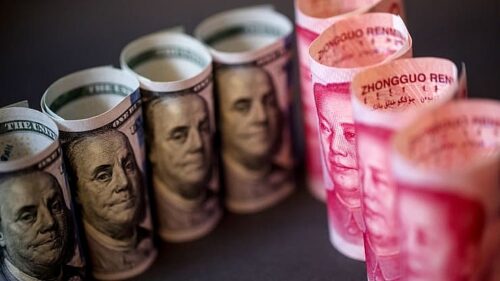>>REAL-TIME UPDATES IN THE WIRE. CLICK HERE<<<
China ramped up efforts to contain the sharp weakening of the yuan by relaxing rules to allow companies to get more overseas financing and major state-owned banks sold dollar bought the Chinese currency to support the yuan.
The People’s Bank of China (PBOC) raised a macro-prudential parameter on cross-border corporate financing to 1.5 from 1.25, effective immediately, the central bank said early Thursday.
The ratio dictates the maximum any company can borrow as a proportion of its net assets and raising the parameters enabled more capital inflows, which could ease the yuan depreciation pressure.
The move was to “further improve the macro-prudential management of cross-border financing, continue to increase the sources of cross-border funds for enterprises and financial institutions, and guide them to optimize their asset-liability,” the PBOC said.
The yuan’s spot value onshore rose following the statement from the central bank and foreign exchange regulator on the cross-border rule change. It strengthened more than 0.8% to a high of 7.1620 per dollar, before last fetching 7.1750.
The PBOC has also been setting its daily fixing of the yuan persistently firmer than market projections over the past few weeks. On Thursday, the central bank raised the yuan’s fixing by 20 pips to 7.1466 per US dollar, which was sharply stronger than the onshore yuan’s closing price of 7.2197 one day earlier.
In addition, China’s major state-owned banks were seen selling dollars and buying the yuan in the offshore spot market in early Asian trades.
The currency is down nearly 4% so far this year, hurt by slowing exports, rising yields in other major markets and an exit of foreign investors disappointed with the post-pandemic recovery.
Nonetheless, traders said the relaxation in foreign borrowing rules may not necessarily bring more dollars into China, given rising yields in the US, Europe and most other markets. The central bank last adjusted the ratio in October 2022 by raising it to 1.25 from 1, to ease yuan depreciation pressure

